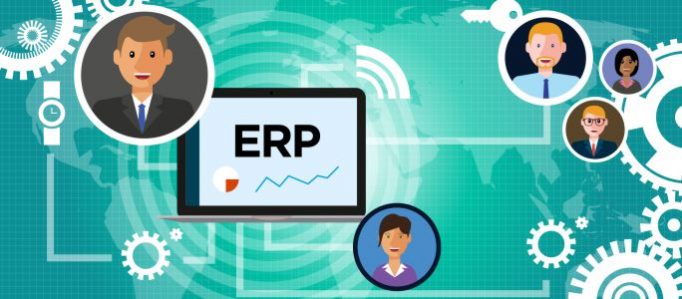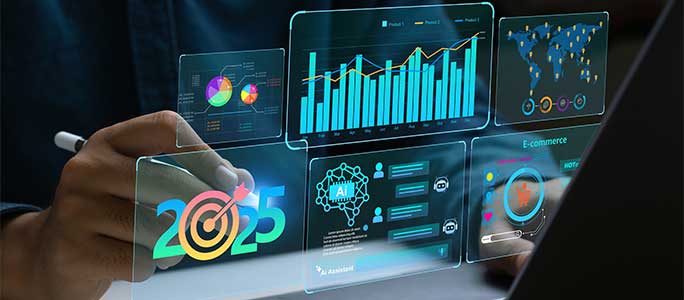The manufacturing industry enjoyed another fruitful year in 2017. Both discreet as well as process manufacturers— made most of the positive business conditions in the manufacturing sector in the year 2017. Enterprise Resource Planning (ERP) systems, who too witnessed a remarkable 2017, also continued to offer support to the manufacturers in their quest to stay ahead of the competition and keep their business processes in order. ERP systems continued to evolve, with new features, concepts, functionality, technology and new ERP trends emerging on to the scene. ERP-enabled automated processes and increased visibility helped the manufacturers reduce costs, gain a competitive advantage and add even more value to their software investment in 2017.
Now that the year has gone and 2018 has dawned upon us, it is a good time to pause and look back at which ERP trends dominated the landscape last year and at the same time, cast a glance forward to what’s in store in the realm of ERP in 2018. Here’s a look at the top ERP trends to look for in this New Year:
- Migration to intelligent ERPs: More and more companies will migrate to intelligent ERPs in 2018. Simply put, an intelligent ERP system is different from a generic ERP, as it comes loaded with capabilities like the Internet of Things (IoT), machine learning, Artificial Intelligence (AI), and advanced analytics, which allow users to dig deep into big data. This will result in better analyzing and forecasting, which, in turn, will translate to enhanced business processes and more efficient use of resources.
- Cloud ERP’s tipping point: Cloud ERP will reach a tipping point in 2018, as more and more major vendors will shift greater focus towards their cloud offerings. SAP S4HANA, Oracle Cloud, Microsoft Dynamics 365 etc., are already aggressively promoting their cloud offerings. There have been a few concerns regarding cloud ERP’s lack of proven track record. The fact that most executives are still more comfortable with on-premise deployments has been another hindrance in cloud ERPs further growth. However, this is likely to change in 2018, as the cloud ERP systems are likely to get wider acceptance.
- Small & mid-size is where the ERP growth is: ERP in 2018 is going to be about small & mid-size companies, as it will no longer be restricted to large companies. As mentioned above, the cloud deployment options along with increased usability will drive the growth of ERPs in the smaller and mid-sized companies segment. Besides, reduced cost of implementation will also contribute to making ERP a viable resource for companies of all sizes.
- Digitalization: With the global economy continuing to improve, more companies scaling for growth will invest in their digital transformation initiatives. Also, more companies are reaching the end of their legacy system lifecycles and thus going through major, market-driven transformation. Hence, there is a strong possibility that many more companies are likely to revisit their ERP system strategies — with going digital being at the core of it — heading into 2018.
- Enhanced features: In the current business scenario, lack of functionality has resulted in users not being able to access and analyze data with the tools available within their current ERP system. This is one of the strongest factors that has driven purchase of new ERP systems in recent times. Gauging this opportunity, more and more ERP vendors are likely to offer enhanced features in the coming year. The areas which will witness marked growth are security, mobile, automation and user interfaces. The vendors are likely to develop tighter controls to protect data. Security audits and risk management procedures will be adapted to ensure that the data is fully secure. Similarly, with the increased use of mobile devices in the workplace and a growing remote workforce, the need for mobile accessibility will also increase, thus forcing vendors to introduce breakthrough advancements in mobile accessibility. There will be more automation of important business processes and activities. Also, the vendors are likely to offer revamped user interfaces; ones that are simple, intuitive and configurable.
- In-memory computing: In-memory computing is yet another concept that is going to create a lot of buzz in the ERP landscape in the coming year. In-memory computing uses random access memory (RAM) to store data instead of storing it in disk-based databases. This will allow regular caching of the data, which in turn will allow locating information much more quickly. In simpler words, in-memory computing will significantly enhance the processing speed of ERP system, as the data stored in-memory can be accessed hundreds of times faster than on a hard disk. Most importantly, in-memory computing will allow viewing aggregate data and more accurate reports in real time.
- Going global: We have said this before, that the globalization of the economy has meant the world has become one small market. Technological advancements in almost all areas have facilitated ease of doing and managing businesses from anywhere and at as many locations in the world. Moving information, data and products from one location to another has never been easier, faster or cheaper than it is today. An ERP, especially cloud ERP, is a huge advantage for global companies because it makes syncing of data so much easier. It allows users to access the same system running in the cloud from their web browser or mobile device, and deploy the application in multiple regions around the world with just a few clicks. ERP in 2018 will continue to go global and assist the businesses in managing their business efficiently from as many locations as they want.
Conclusion: As clichéd as it may sound, but 2018 will be the year of ERP. Companies of all sizes will go for ERP implementation, with more and more companies opting for intelligent ERPs with latest functionalities. Digitalization will continue to take the centre-stage, while vendors will look to enhance the features of their ERP offerings. Cloud ERP will reach its tipping point, with 2018 being a crucial year in its progress. In-memory computing is likely to be the buzzword. One such ERP which, will keep businesses ahead in this transformational year, is BatchMaster ERP. For more information about our products, log on to https://www.batchmaster.co.in/ or write to us at sales@batchmaster.com.




















